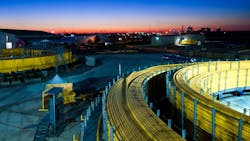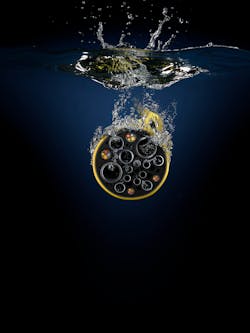Chevron has awarded Aker Solutions a master agreement to provide umbilicals for its operated oil and gas fields in the US Gulf of Mexico.
The first job involves providing 24 km (15 mi) of 20,000-psi steel tube umbilicals for the Anchor development, 225 km (140 mi) offshore Louisiana in a water depth of 1,524 m (5,000 ft).The work scope includes engineering, design and manufacture of dynamic and static control umbilicals, dynamic and static power umbilicals and distribution equipment, and service/ installation support. The company’s facility in Mobile, Alabama, will manage the program.
The master agreement is said to lay the foundation for a long-term collaborative relationship incentivizing both companies to jointly improve their long-term technical and commercial performance through delivering multi-project synergies, repeatability, and life-of-field thinking.
Chevron also contracted Subsea 7 to provide subsea installation services for the Anchor project. The work scope includes project management, engineering, procurement, construction and installation of the SURF components including, but not limited to, the production flowlines, risers, umbilicals, flying leads, jumpers, and associated appurtenances.
Project management and engineering are under way at the company’s offices in Houston. Fabrication of the flowlines and risers will take place at its spoolbase in Ingleside, Texas, with offshore operations anticipated to occur in 2022 and 2023.
Craig Broussard, vice president for Subsea 7 US, said: “The combination of the SURF scope for Subsea 7 and the ongoing subsea equipment delivery by OneSubsea, will allow the Subsea Integration Alliance to work in partnership with Chevron to unlock the value of an integrated approach to project optimization.”
Mero to feature stainless steel umbilical tubes
Sandvik will supply stainless steel umbilical tubes for Petrobras’ Mero oil field project in the presalt Santos basin offshore Brazil. According to the company, field developments in the region more typically use thermoplastic hose umbilicals.
For this contract, Sandvik will supply more than 500 km (310 mi) of super duplex Sandvik SAF 2507 stainless steel umbilical tubes encapsulated by Prysmian Group. Mero is managed by the Libra Consortium, a partnership between Petrobras, Total, Shell Brasil, CNPC, and CNOOC.
Mero Phase 1 calls for 17 wells in a water depth of around 2,000 m (6,562 ft).
According to Sandvik, deeper offshore fields require more robust subsea equipment to withstand higher pressures, corrosion and erosion. SAF 2507 is an austenitic-ferritic stainless steel said to provide strong resistance to stress corrosion cracking, pitting and crevice corrosion, erosion corrosion and corrosion fatigue, with high mechanical strength and good weldability features.
In addition, the company claims, umbilical seamless tubes made from this material provide stronger structural reinforcement in smaller sizes compared to thermoplastic technology.
TechnipFMC secures Australia, Angola assignments
Woodside Energy has awarded TechnipFMC an integrated EPCI (iEPCI) contract for the Lambert Deep and Greater Western Flank Phase 3 developments offshore northwest Australia. The company will design, manufacture, and install equipment including subsea production systems, flexible flowlines and umbilicals for connection to the Angel platform. The latter is about 120 km (74.6 mi) northwest of Karratha and is connected to the North Rankin Complex via a 50-km (31-mi) subsea pipeline.
This is the second contract under TechnipFMC’s recent five-year iEPCI frame agreement with Woodside.
Arnaud Pieton, President Subsea at TechnipFMC, said it confirmed “our common ambition to transform subsea economics through integration, standardization, and configurability.”
BP has awarded the company an iEPCI contract for the deepwater Platina field development in block 18 off Angola. Water depths range from 1,200-1,500 m (3,937-4,921 ft). The award covers the manufacture, delivery, and installation of subsea trees, a production manifold with associated subsea control and connection systems, rigid pipelines, umbilicals and flexible jumpers.
In addition, TechnipFMC has postponed its planned separation into two new businesses. Market conditions brought on by the COVID-19 pandemic have deteriorated, the company said, with a sharp decline in commodity prices and heightened volatility in global equity markets. The present environment therefore does not justify the separation into TechnipFMC and Technip Energies, the company said.
It stressed that the strategic rationale for the separation is unchanged. It remains committed to the transaction and will continue preparations to ensure that the two companies are ready for separation once conditions have improved. •
About the Author
Jessica Stump
Editor
Jessica Stump is editor of Offshore Magazine. She uploads and writes news to the website, assembles surveys and electronic newsletters, and writes and edits articles for the magazine. She was the summer editorial intern at Offshore in 2009 and 2010 before joining full time in April 2011. She has a journalism degree from Texas Tech University.


